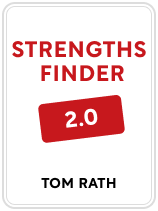

This article is an excerpt from the Shortform book guide to "StrengthsFinder 2.0" by Frederick Brooks. Shortform has the world's best summaries and analyses of books you should be reading.
Like this article? Sign up for a free trial here .
Do you work hard to overcome your weak points? What if you focused on your strong points instead?
An accompaniment to Gallup’s popular online strengths test, StrengthsFinder 2.0 by Tom Rath helps you understand and implement your test results to maximize your potential. Both the test and book are based on the idea that you shouldn’t try to correct your weaknesses—as most schools and workplaces have you do—but should rather build upon your strongest innate abilities. Doing this gives you the greatest chance of succeeding in whatever you pursue.
Here’s more on why you should focus on your strengths, not your weaknesses.
The Problem With Modern Self-Improvement
Most forms of personal improvement, whether they apply to job performance, a creative pursuit, or education, revolve around correcting weaknesses, writes Rath. For example, if you take an art class, your teacher will likely try to improve your abilities by addressing your weakness of not being able to sketch well. This approach to improvement is predicated upon the idea that you can overcome any weakness if you invest enough effort into doing so, asserts Rath.
(Shortform note: This approach to improvement is also crucially predicated upon the idea that you know what your weaknesses are. However, many people don’t because they have a blind spot for their weaknesses: They’re unable to see them or don’t perceive them as serious.)
You Can’t Fully Overcome Your Weaknesses
However, Rath claims that you can’t overcome every weakness by simply trying hard enough. You have certain innate weaknesses you can’t get rid of—or shouldn’t try to get rid of because the costs of doing so would outweigh the minor improvements you’d see.
For example, you might be innately bad at science. You could spend hundreds of hours studying to overcome this weakness. However, even if you do so, you still won’t succeed as much as someone who’s innately gifted in science. You’ll thus have spent hundreds of hours striving toward something you’ll never excel at, rather than striving toward something you can excel at.
(Shortform note: Rath argues that trying to overcome weaknesses can have major downsides. A particularly harmful downside of attempting to eradicate your apparent “flaws” is that in certain situations, they can be strengths. For example, perfectionism can be both a weakness—it leads to extreme self-criticism and black-or-white thinking—and a strength: It often leads to excellent output. If you tried to eradicate your perfectionism entirely, your output may suffer.)
The Solution: Build on Your Innate Abilities
Instead of investing time and energy into canceling out your weaknesses, focus on your strengths, not your weaknesses. Strive to build on your innate abilities, recommends Rath. Doing so gives you a far greater chance of growing and succeeding in whatever you pursue, especially your career.
For example, rather than trying to improve your sketching abilities (your weakness), focus on landscapes, which you’re innately good at. That way, you’ll become an exceptional landscape artist, whereas if you invest equal energy into your sketches, you’ll be average at best.
(Shortform note: Rath contends that building upon your innate abilities helps you succeed in your pursuits, including at work. In So Good They Can’t Ignore You, Cal Newport takes this idea a step further to say that building upon innate abilities is how you get to do work you not only excel at, but also enjoy. It’s incorrect to think you can stumble upon a dream job that only requires your existing, undeveloped skill set, claims Newport. Instead, build up your innate abilities so you become such a valuable asset that employers let you do exactly the sort of work you want to do.)
To focus on strengthening your innate abilities, first identify them, writes Rath. This is where the Strengths Test comes in: The test checks for 34 innate abilities and tells you what your top five or 10 are.
(Shortform note: The ethics and usefulness of personality tests like the Strengths Test and the Myers-Briggs Type Indicator (MBTI) have been widely debated. In particular, critics claim that the MBTI has little grounding in psychology and, when used in a hiring context, doesn’t correlate with later job performance. What’s more, it may be a bad idea to rely on personality tests to inform your work and lifestyle choices, as Rath recommends. This is because such tests can present an inaccurately narrow view of your personality, causing you to limit yourself to certain activities when you’d actually enjoy and excel at a wider range of pursuits.)

———End of Preview———
Like what you just read? Read the rest of the world's best book summary and analysis of Frederick Brooks's "StrengthsFinder 2.0" at Shortform .
Here's what you'll find in our full StrengthsFinder 2.0 summary :
- An accompaniment to Gallup’s popular online strengths test
- How to understand and implement your test results to maximize your potential
- Why you shouldn’t try to correct your weaknesses






